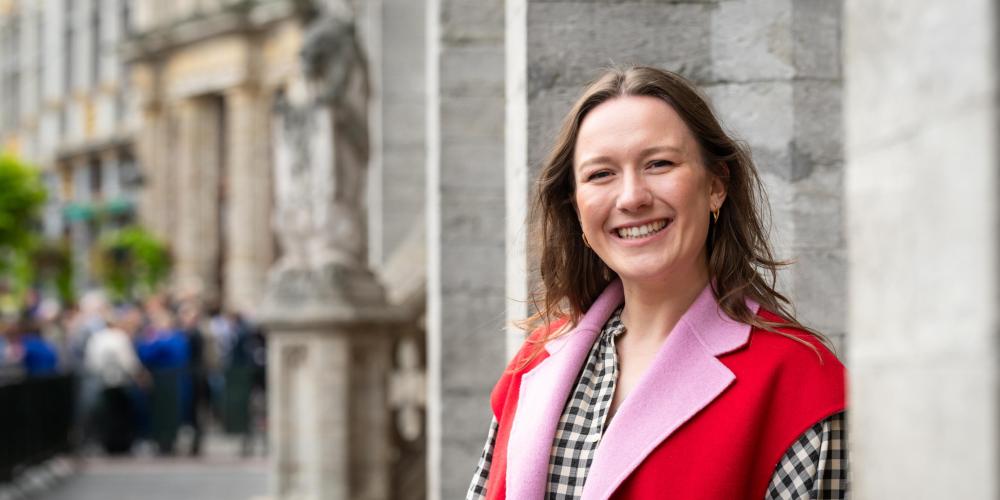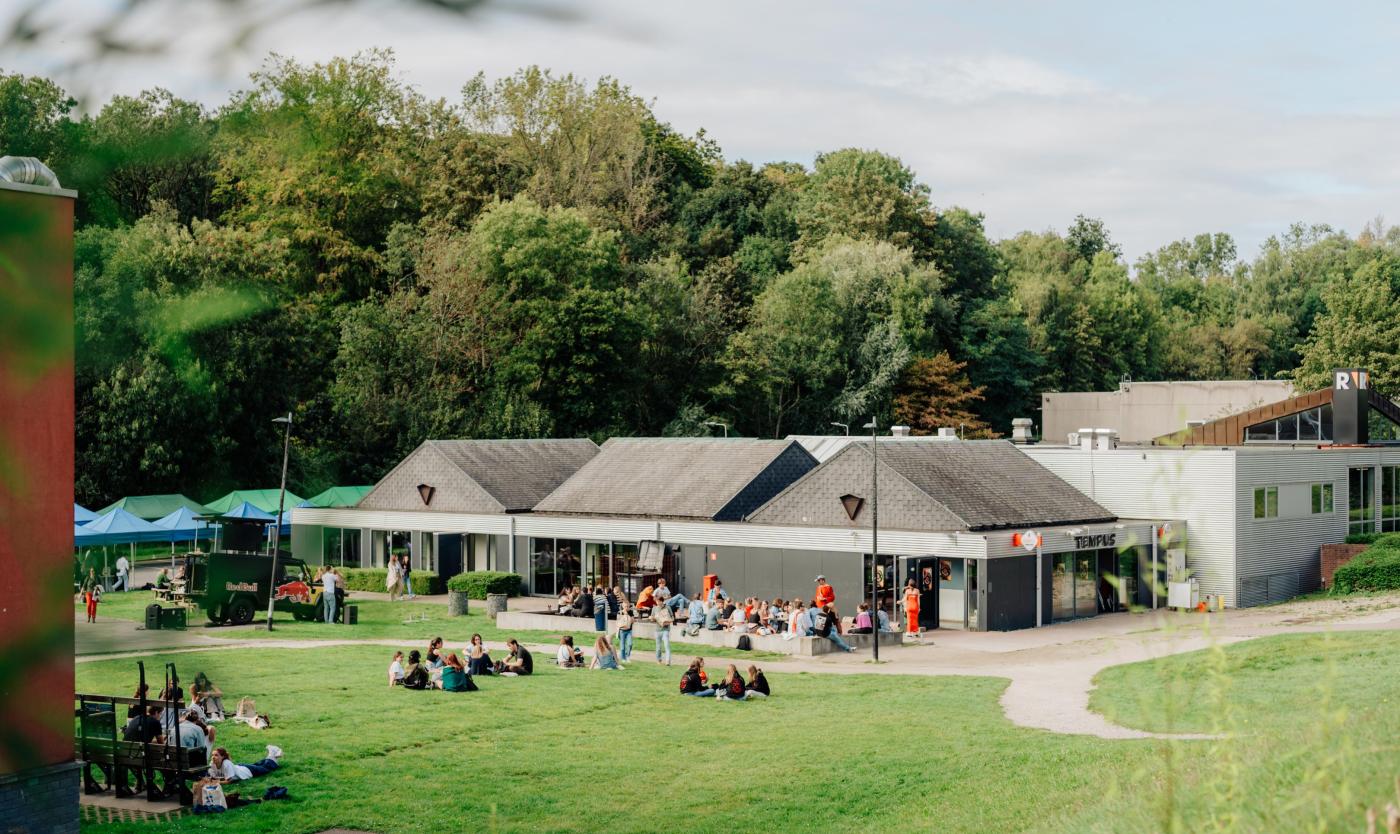
As a biomedical researcher, there are possibilities beyond lab work. Tina De Bruyn Carlier coordinates treatment pathways at UZ Brussel for cancer patients participating in oncological trials with new cancer drugs. “I’m exactly where I’m meant to be.”
As a biomedical researcher, are you in direct contact with patients?
“Yes, today I’m involved in the stage where cancer drugs are tested on humans. That means there’s a lot of human interaction. Many people are surprised by that. I myself didn’t realise for a long time that this was even an option. When I started studying Biomedical Sciences, I hesitated for exactly that reason. I didn’t see myself working in a lab, but I was fascinated by the subject matter. I thought: I’ll see where it takes me. It wasn’t until my final year at the VUB, while doing my thesis in immunodermatology, that it became clear to me: with a degree in Biomedical Sciences, you don’t necessarily have to stay in the lab. There are other paths too. That was a revelation.”
During your studies, you spent a long time uncertain about your future options. How did you stay motivated?
“It was definitely tense at times. Many of my fellow students were keen to work in a lab or were already aiming to start a PhD. Even during their bachelor’s, they knew exactly what they wanted. Their clarity sometimes made me feel unsure, but I was convinced that if I gave it my all, the ‘right’ opportunity would come my way. So I put 100% into earning my degree. Today, I’m really glad I stuck with it. I’m so happy with what I do now. I’m in the right place.”
“I have the chance to make a difference at a moment when people are incredibly vulnerable”
What do you find most engaging about your job?
“It’s not an easy environment — it is oncology, after all. But I’m in daily contact with people at a major crossroads in their lives. I have the chance to make a difference when they’re incredibly vulnerable. That’s why every day, I go home with the feeling that what I’ve done has truly mattered.”

Tempus, the student café on the VUB Health Campus in Jette
How do you look back on your student years?
“There are so many memories, but if I had to sum them up in one word, it would be ‘warmth’. I always felt supported at the VUB. There was a little flame inside me that was constantly kindled by the experiences I had and the connections I made. Of course, there were less enjoyable classes now and then, but sharing those with people going through the same thing was incredibly valuable. Many of those people are still part of my life today. Sharing your student years is a unique experience. Together, we grew up — and now we share other major milestones. Just last week, we celebrated the wedding of a close friend from our group. I hope we’ll keep seeing each other for the rest of our lives.”
What kind of things did you typically do with friends during your student days?
“It’s no secret that the Jette campus isn’t as cosy as the one in Etterbeek. So we had to get a bit creative when it came to having fun. The student café Tempus was a staple. There was always a great vibe there. And before and after class, you’d usually find us lounging in the armchairs by the library.”
Which professor do you have fond memories of?
“Rector Caroline Pauwels. I only had one guest lecture from her, but I think she was an icon and an inspiration for every VUB student. I also think of professors like Ilse Smolders, Kurt Barbé, and Ron Kooijman. Their way of teaching was stimulating. They made you want to really dig into the material. The teaching assistants also deserve credit — they were very approachable. Sometimes they even made time for one-on-one help. Without Professor Drina Jaspers, for example, I’d never have made it through organic chemistry.”
Was choosing VUB a conscious decision?
“I’m from the area, so I never really doubted where I wanted to study. It was a clear choice — not just because of the location, but also because I was drawn to the VUB’s mindset. A VUB student is someone free from prejudice. At the VUB, you’re given space to form your own vision and opinions, and then to engage respectfully in dialogue about them. I find it unique that a university encourages an attitude where disagreement isn’t a source of conflict, but a starting point for dialogue. Those values still guide me in my work today. I’m very proud of that.”
“Compassion was always important in my work, but today I bring it with even more intention”
Can you give a real-world example?
“In Jette, we treat patients from very diverse backgrounds, each with their own story. I often meet people whose perspectives differ greatly from mine. At the VUB, I learned how to deal with that. Not long ago, I encountered a patient who didn’t want her family to know about her cancer diagnosis. As it happened, I knew her daughter. Of course I respected her wishes, but it was a difficult situation. I knew her daughter would want to be there for her. In moments like that, I mentally return to the core values of the VUB. I don’t have to understand her choice — people are allowed to hold their own views and make their own decisions. As caregivers, it’s our job to accept that. Even when it’s tough, those VUB values help me make sense of such situations.”
Lastly, what’s your advice for today’s students?
“For anyone entering healthcare: take your compassion with you to the hospital alongside your white coat. Remember that the people you meet are at a crossroads, they’re vulnerable, and they’re placing their trust in your hands. That’s the greatest compliment you can receive. Be grateful for that, and treat it with care. I speak from experience. Last year, I was hit by a car while cycling home. I was very lucky that day. I lost consciousness and spent months in serious rehabilitation. I became a patient myself — and I had to place my trust in others. That came naturally, because I felt seen. I felt cared for and surrounded with warmth. I carry that experience into my work. Compassion was always important to me, but now I bring it with even more intention.”*
Bio – Tina De Bruyn Carlier
After earning her bachelor’s in Biomedical Sciences, Tina De Bruyn Carlier completed a Master of Biomedical Research at the Faculty of Medicine. She graduated in 2021. Today, she coordinates experimental clinical studies in the Department of Medical Oncology at UZ Brussel.
*This is a machine translation. We apologise for any inaccuracies.